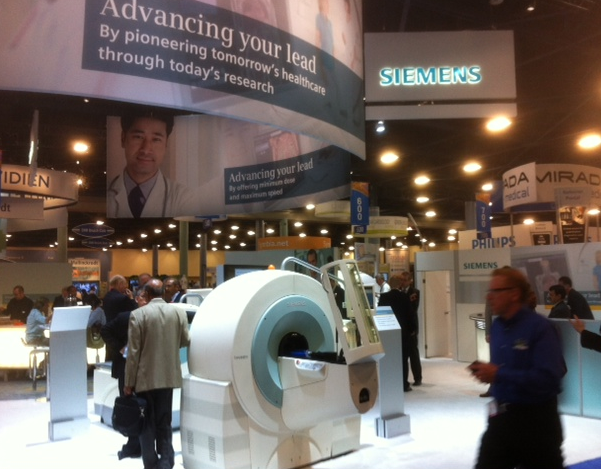There’s been a lot of chatter at the annual meeting of the Society of Nuclear Medicine and Molecular Imaging about radiation dosage. The society even released a radiation dose optimization position statement, which we blogged about Tuesday. Molecular imaging players seek the holy grail of higher production and lower patient dose.
There’s been a lot of chatter at the annual meeting of the Society of Nuclear Medicine and Molecular Imaging about radiation dosage. The society even released a radiation dose optimization position statement, which we blogged about Tuesday. Molecular imaging players seek the holy grail of higher production and lower patient dose.
We had a chance to talk with James F. Alton, a Siemens imaging product specialist, about their Symbia family of single-photon emission computed tomography (SPECT)-CT systems. There are a number of options, but as Jim put it, they all have one thing in common.

“Our big buzzword is minimum dose, maximum speed, which translates to patient comfort, image quality and physician confidence,” he said. “So we can do faster acquisition times at a lower dose for the patient. It’s important, because you’re asking a patient to lie on a table for an extended period of time, and to hold still for that period of time. So you do a CT and a SPECT study sequentially and the patient is in the same position, and I can look at the perfusion (cardiac blood flow) and the anatomy simultaneously. The result is the patient doesn’t have to lie on the table as long and I’m getting better images for the physician to read.”
Of course, there are tradeoffs. The PET scans are generally believed to provide better image quality. SPECT technology uses a lower dose radiopharmaceutical. “The other thing you have with SPECT are collimators, which narrow and control the gamma rays coming from the patient to the detector,” said Alton. “With PET you have no collimators.”
Symbia’s IQ-SPECT technology, which received the 2011 North American Nuclear Cardiology Product Differentiation Excellence of the Year Award, enable routine scans using half the dose while doubling the speed. Said Alton: “Standard acquisition time for SPECT cardiac is 16 minutes. We can now do it in four minutes. so that’s real important again for patient comfort because they only have to lie on the table for a short period of time.
“If you’re looking at it from a throughput standpoint, I can do more patients in a day with IQ-SPECT. I can actually do three patients in the same time it takes to do one with the traditional system. This is important for pediatrics and geriatrics. With older people they may not be able to hold their arms over their head for a period of time. With pediatrics sometimes you have to use sedation.”
Different systems have different uses. SPECT is used more in cardiology, measuring perfusion, while PET systems are used more in oncology. With SPECT, “we’re doing a lot of dynamic acquisitions where we inject a radiopharmaceutical and watch blood flow into a certain organ,” Alton explained. “With PET, we’re looking at basically tumor localization. So if I’m looking at a small lesion with PET I can see that nicely on a PET-CT system, where I can’t see it as well with SPECT. I can still do some whole body imaging where I’m looking at metastatic workups, but if Im looking at just very small lesions I would use PET.”
Alton said the SPECT system suits the requirements of many institutions. “A lot of hospitals don’t need PET right now.,” he explained. “They can manage with SPECT imaging, with a lower radiopharmaceutical and a lower dose. And they can still do some oncology imaging. This is a general purpose type of camera, useful for all kinds of imaging.”










